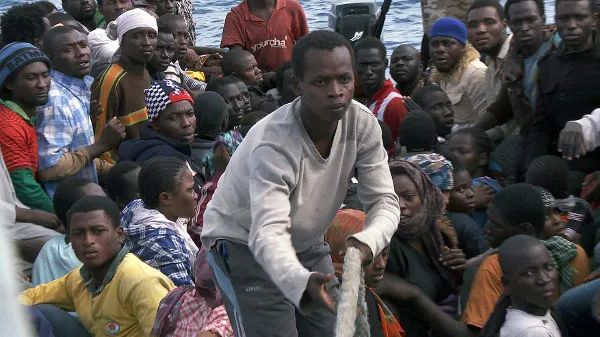Eye For Film >> Movies >> Eldorado (2018) Film Review
Eldorado
Reviewed by: Amber Wilkinson

Markus Imhoof blends the intensely personal with the sociopolitical in his latest documentary, which sets the story of Europe's modern failures regarding refugees against the recollection of his own experience of his family offering shelter to a young Italian girl during the Second World War. Given that the current crisis is the biggest since that period, it's a fair point of comparison and one which gives the film an additional emotional heft as he returns again and again to the concept of who we consider to be "us" and our fixation with putting "I" first no matter what cost.
Others have charted this territory in the past, with films like Fire At Sea zooming in on those risking their lives to cross to Italy in search of a new life. Imhoof opens the debate out to consider the unsavoury economics of the situation, with the personal touchstone ensuring that his film retains a character of its own that marks it out from others on the same subject. The title, of course, references the mythical city of gold, but when, in the opening moments of the film, we see something glinting in the light, it is heartbreaking to realise this is not a precious metal but the gold foil of a rescue blanket clutched round the shoulders of someone fished from the water.

As Imhoof looks through old family photos, he recalls how their 'adopted' refugee Giovanna looked when he first saw her, which finds its echoes in the modern footage of medics triaging the newly rescued - many of whom are weak from exhaustion or simply bewildered by circumstance. Later, he describes the tragic arc of Giovanna's story, a specific in a sea of similar tales. At a micro level, the human urge to help is captured in all its glory. The dedication of those whose lives are marked by the regular pick up of people overladen boats is clear. "Every day is going to be better," one of the rescuers tells them, adding, "We will not promise you paradise."
But, what, Imhoof chips away at, is paradise? For one it might be a city of gold, but for another it may simply be living out your life free from fear. Later, a refugee currently in Italy talks about paradise again, and his current predicament in what he refers to as 'purgatory'.
Away from the boats, the director takes risks, sneaking a camera into one of the many makeshift camps that have sprung up and which are run by mafia capos, who get rich off the back of the refugee men's labour in the tomato fields - women, we are told, are not considered strong enough. He also goes back to Switzerland, the border between his homeland and Italy scarcely marked, to consider the way that despite the fact refugees are fulfilling much-needed roles in society - such as caring for the elderly - they are snared by red tape and sent back to the place they fear most. Imhoof digs into the economics. How the product of the slave labour of the tomato pickers will likely be bought by their relatives back home using what little money those working in the fields can send them, or the way that EU milk production is killing the ability of farmers in Africa to make a profit. These are, perhaps simplified, small examples, but they speak to a bigger picture of a global trading ring that creates a vicious circle for Africa.
There is a slightly sprawling quality to the film, and the two time-period narrative takes a while to find a smooth flow, but Imhoof makes sure to connect the dots and strikes a good balance of factual information and personal testimony, both from himself and others he meets along the way.
This film isn't just about the movement of people but the movement of profit and while the bank balance of Europe may come out looking rosy, it comes with the price of being morally bankrupt.
Reviewed on: 24 Feb 2018
















